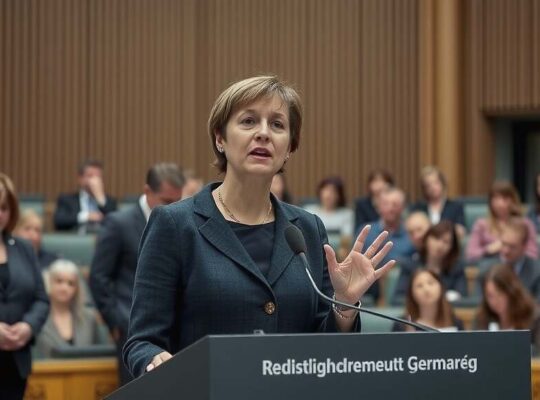Disagreements are emerging within Germany’s governing coalition regarding tax policy, specifically concerning relief for lower and middle incomes and potential increased levies on high earners.
Members of the CDU/CSU parliamentary group have expressed cautious support for the Social Democrats’ (SPD) proposal to reduce the tax burden on small and medium earners, a commitment outlined in the coalition agreement. Steffen Bilger, parliamentary managing director for the CDU/CSU, affirmed the Union’s commitment to this goal, highlighting the long-standing demand for raising the income tax threshold for the top tax rate as a topic for discussion with the SPD. However, he cautioned against policies perceived as class warfare, emphasizing the importance of recognizing and rewarding hard work, responsibility and achievement – particularly for skilled workers, tradespeople and entrepreneurs. He argued that tax increases, especially during economically challenging times, could harm the backbone of Germany’s Mittelstand (small and medium-sized businesses), jeopardizing investment and employment.
Dirk Wiese, parliamentary managing director of the SPD, has publicly suggested that alongside tax relief for lower and average earners, higher incomes should be taxed more heavily, framing this as an open topic for negotiation, drawing parallels to how the Union pursues its own priorities.
The AfD party has criticized the SPD’s proposal as an attempt to revive its image as the party representing workers. Kay Gottschalk, an AfD finance politician, argued that Germany’s problem lies not with revenue generation but with expenditure and called for stricter control of spending, including EU contributions. He expressed concern over Germany’s declining competitiveness as an investment location and the impact of high taxes and levies on attracting skilled workers.
The Green Party has accused the governing coalition of potentially breaking its promises. Andreas Audretsch, a Green Party parliamentary deputy, pointed to the coalition agreement’s commitment to reduce income taxes for small and middle incomes, suggesting this is now in jeopardy. He criticized the government for prioritizing tax cuts for the wealthiest 1% through the recently approved investment stimulus package while claiming insufficient funds for broader measures like reducing electricity taxes. He characterized the coalition under Friedrich Merz as favouring the ultra-rich at the expense of the wider population.
The Left party is advocating for more comprehensive tax reforms, including the reintroduction of wealth tax. Party leader Heidi Reichinnek criticized the current system as perpetuating injustice, arguing that hard work is often underappreciated while inherited wealth remains largely untaxed.












